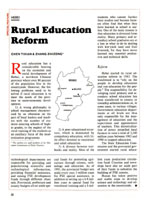Rural education has a considerable bearing on the economic and social development of Hebei, a northern Chinese province where over 80 percent of the population live in the countryside. However, the following problems need to be solved if rural education is to meet the needs of the province in socio-economic development.
1) A wrong philosophy in school management characterized by an obsession on the part of local leaders and teachers with the number of students entering schools of higher grades, to the neglect of the rural training of the students as an auxiliary force of the modernization programme.
2) A poor educational structure, which is dominated by compulsory education, with little effort devoted to vocational and adult education.
3) A divorce between textbooks and reality. Most of the students who cannot further their studies and become farmers often find that what they have learned in school is useless. One of the main reasons is that education is divorced from reality. Many primary and secondary school graduates are at a loss as what to do in dealing with low-yield land and frail livestock, for they have never learned any essential productive and technical skills.
Reform
Hebei started its rural education reform in 1983. The watchword is to “rely on the people to develop education and run education for the people.” The responsibility for developing rural primary and secondary school education has been transferred to county or township administrations or, in some cases, to various villages. Government education departments at all levels are thus only responsible for the management of education and the supervision and appointment of teachers. This decentralization of power propelled local farmers to raise a total of 3,100 million yuan between 1983 and 1990 to support education.
The State Education Commission and the provincial government started rural education reform on a trial basis, first in three counties and then expanded the experiment to twelve counties. All counties involved have yielded positive results in the reform.
After repeated studies and discussions, education administrators at all levels and teachers have come to the conclusion that rural areas should not copy cities in running education, that rural education should serve local economic development, and that adult education should be developed to train the personnel needed locally. In compulsory education, consideration should be given to the practical needs of the students who will return to the land upon graduation.
Much has been done to co-ordinate compulsory education, vocational and technical education, and adult education. The reform requires that, rather than strive to send as many students to college as possible, rural schools should bring forth a vast contingent of people with one practical skill or another and to raise the qualifications of the entire local labour force.
Primary schools in rural areas are also asked to teach the pupils the basics of agricultural activities and production skills, and their teaching material should reflect local conditions and include courses on local economy, geography and history. Each class should be allocated a piece of land so that the pupils can set up their own small experimental farms, orchards or grazing ground.
One, “three plus one” school system has been experimented with in junior high schools, which means that junior high school students who have finished their three-year compulsory programme but failed senior high school entrance exams can receive an additional year of technical training. The schooling system has also been changed so that in a course of nine years the students stay in primary school for five years and junior high school for four years. This system calls for the addition of vocational and technical courses in junior high schools to meet the needs of those students who will return to farm work. The junior high school curriculum now features such courses as tree cultivation, poultry farming, livestocks breeding and scientific farming, which take up 20 to 25 percent of the total teaching hours throughout the four years.
Students are encouraged to participate in social activities such as the prevention and control of plant diseases and insect pests and the propagation of family planning. This is designed to raise the students’ awareness of local production and social activities. In Wanxian County, thanks to primary and high school students who helped popularize agricultural techniques, local peasants successfully checked the spread of insect pests and avoided an economic loss of more than 800,000 yuan in 1984.
Hebei Province has also come a long way in the building of comprehensive vocational and technical schools which 1) offer courses according to actual needs; 2) give consideration to both pre-or post-vocational education; 3) have varied and flexible ways of running schools (schooling ranges from three years to only a week); 4) establish contacts with scientific research institutes, colleges and universities to absorb high technology and information, co-operate with local agricultural and scientific department, and work to diffuse information and technology among local people; 5) serve as centres for professional training and scientific experiments. In this way these schools have contributed to local economic and social development.
What has happened in Nan-gong City’s No.2 Vocational School is illustrative. To carry out the policy of combining education with productive labour, the school has set up seven experimental agricultural bases for students to practice what they have learned. In this way, the students not only get practical training, but also are able to make some money. Teachers and students have been organized into technical service groups for the prevention of diseases in fruit trees, livestock and poultry. This has proved so effective that farmers who did not believe in sciences before have become science enthusiasts. The school has also offered technical training to township and village leaders.
Adult Education
Many towns and villages in Hebei run their own adult schools, which provide fulltime teachers, experimental bases and necessary teaching instruments. Farmers with junior or senior high school education go to these schools during the slack farming season or in the evening. In the busy season, technical training classes are arranged in the fields so that farmers can apply what they have just learned. Efforts are also made to wipe out illiteracy. In 1990 alone, in the 12 counties experimenting with the reform of rural education, 16,175 youths and adults learned to read and write.
At the county level, departments concerned have joined forces to build vocational and technical schools or technical training centres. For example, Huailu County has combined a number of schools originally run by different departments into the Huailu County Comprehensive Vocational and Technical School.
At the township level, comprehensive service stations have been set up, providing farmers with scientific training and agricultural products and building up service networks.
Technical services have been integrated with farmers, training and the supply of agricultural products. There are now 4,000 such groups in Hebei Province engaged in this task, earning an annual profit of more than 2 billion yuan.
Efforts have been made to involve colleges and universities in rural education reform.
Over the years, the State Education Commission and the Hebei provincial government have asked more than 20 colleges and universities, including Qinghua University, Tianjin University, Nankai University, Beijing Normal University, and Hebei Agricultural University, to participate in Hebei’s Experimental Areas of Rural Education Comprehensive Reform. These institutions of higher learning have helped various counties work out overall plans for economic and social development, compiled textbooks on labour skills in light of local conditions, and trained teachers. They have also joined in county-run or township-run enterprises' technical innovation and the development of new products.
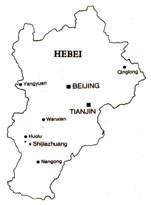
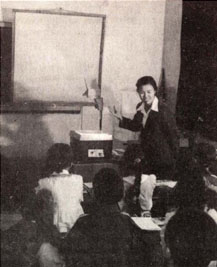
Slides are shown at a class in the Bailingzhuang Primary School. XIN HUA
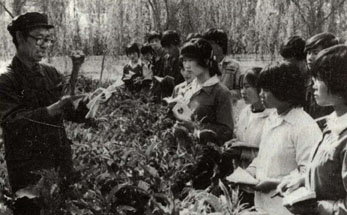
A professor teaching his students how to grow medicinal herbs. X1N HUA

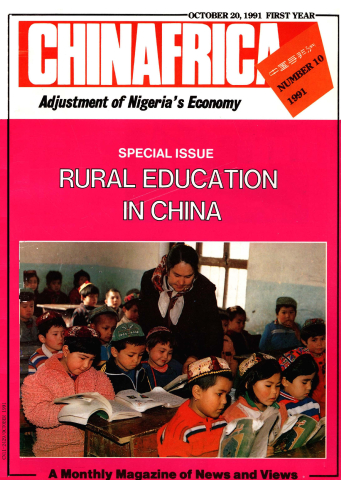
 Copy Reference
Copy Reference 